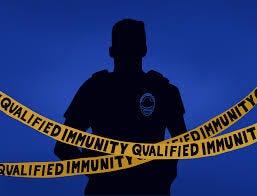Qualified immunity is a legal doctrine in the United States that protects government officials, including police officers, from being held personally liable for actions that they take in the course of their official duties, as long as their actions do not violate clearly established constitutional or statutory rights of which a reasonable person would have known.
This means that police officers can avoid civil lawsuits for damages caused by their actions, even if those actions were unconstitutional, as long as the officer can prove that they were acting in good faith and within the scope of their official duties. In order for a police officer to be held liable under qualified immunity, the plaintiff must show that the officer violated a "clearly established" constitutional right that a reasonable person would have known.
Critics of qualified immunity argue that it can shield police officers from accountability and make it difficult for victims of police brutality or other abuses of power to seek justice. Supporters of qualified immunity argue that it is necessary to protect police officers from frivolous lawsuits and to ensure that they can perform their duties without fear of being sued for every mistake they make. One example of a time when an officer violated a "clearly established" constitutional right that a reasonable person would have known is the case of Floyd v. City of New York. In this case, a group of black and Latino plaintiffs sued the New York City Police Department (NYPD) for their stop-and-frisk practices, which they claimed were racially discriminatory and violated their Fourth and Fourteenth Amendment rights.
The plaintiffs argued that the NYPD had a policy of stopping and frisking people based on their race, without any reasonable suspicion of criminal activity. The court found that the plaintiffs had provided sufficient evidence to establish a prima facie case of racial profiling, and that the NYPD's practices violated the plaintiffs' Fourth and Fourteenth Amendment rights.
The court also held that the NYPD's policies were "clearly established" constitutional violations, and that a reasonable officer would have known that they were unconstitutional. As a result, the officers involved in the case were not protected by qualified immunity, and the plaintiffs were able to pursue their claims for damages against them.







